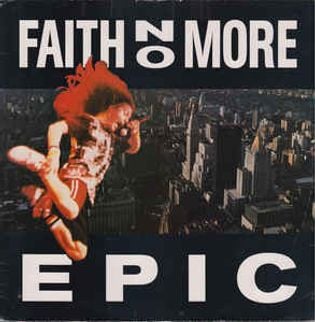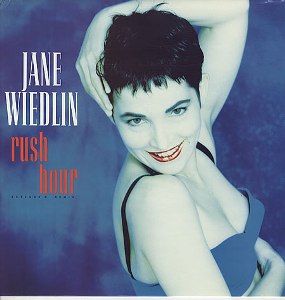 “You Give Love A Bad Name” by Bon Jovi is the kind of song that practically defined an era. Released in 1986 as the lead single from Slippery When Wet, it quickly became a massive hit, propelling Bon Jovi to superstardom and solidifying their reputation as masters of the arena rock anthem. The song opens with an instantly recognizable guitar riff that punches through the speakers with an energetic, almost rebellious intensity. It immediately signals that this is a track fueled by raw emotion and the kind of theatricality that would come to define Bon Jovi’s sound throughout the 1980s. The guitar, played with tight precision and drenched in rock energy, is paired with a driving rhythm section that never lets up, providing a perfect platform for Jon Bon Jovi’s vocal performance. The riff itself is deceptively simple, yet its punch and melodic quality give it a hook that stays in the listener’s mind long after the first listen. The drums hit with deliberate force, punctuating each lyric and creating a sense of urgency that mirrors the song’s themes of heartbreak, betrayal, and emotional intensity.
“You Give Love A Bad Name” by Bon Jovi is the kind of song that practically defined an era. Released in 1986 as the lead single from Slippery When Wet, it quickly became a massive hit, propelling Bon Jovi to superstardom and solidifying their reputation as masters of the arena rock anthem. The song opens with an instantly recognizable guitar riff that punches through the speakers with an energetic, almost rebellious intensity. It immediately signals that this is a track fueled by raw emotion and the kind of theatricality that would come to define Bon Jovi’s sound throughout the 1980s. The guitar, played with tight precision and drenched in rock energy, is paired with a driving rhythm section that never lets up, providing a perfect platform for Jon Bon Jovi’s vocal performance. The riff itself is deceptively simple, yet its punch and melodic quality give it a hook that stays in the listener’s mind long after the first listen. The drums hit with deliberate force, punctuating each lyric and creating a sense of urgency that mirrors the song’s themes of heartbreak, betrayal, and emotional intensity.
Jon Bon Jovi’s vocals are the centerpiece of the track, delivering a blend of grit, passion, and melodic power. His voice rides the dynamics of the song, shifting from plaintive verses that convey betrayal to soaring, anthemic choruses that invite the listener to sing along. The lyrical narrative of “You Give Love A Bad Name” captures the universal experience of romantic heartbreak, presenting it with a dramatic flair that borders on soap-opera level intensity. Lines like “Shot through the heart, and you’re to blame” encapsulate the emotional drama, transforming personal pain into a public anthem. There is a theatricality in Jon’s delivery that makes the heartbreak feel larger than life, perfectly suited for the stadium and arena settings where the song would become an iconic sing-along moment.
The chorus of “You Give Love A Bad Name” is a masterclass in arena rock. The melodic hook is instantly memorable, and the phrasing encourages audience participation, which became a hallmark of Bon Jovi’s live performances. This chorus elevates the song from a simple tale of romantic betrayal to a communal experience, where the listener is invited to join in the drama and catharsis. It’s not just a chorus; it’s a rallying cry for anyone who has ever felt wronged in love, and that universality has helped the song endure across decades. The way the band layers harmonies in the chorus adds a richness that contrasts perfectly with the raw punch of the verses, balancing vulnerability and strength in a way that keeps the listener engaged from start to finish.
Musically, the song is deceptively structured. While the verses maintain a tight, driving rhythm that emphasizes the narrative of betrayal, the pre-chorus builds tension with a sense of inevitability, leading into a chorus that feels both triumphant and cathartic. This dynamic structure gives the song momentum, creating a sense of push-and-pull that mirrors the emotional turbulence of heartbreak. Richie Sambora’s guitar work deserves particular mention, as his solos and melodic fills add a layer of sophistication to the otherwise straightforward rock arrangement. The solo in “You Give Love A Bad Name” is concise but impactful, providing a perfect release of tension after the emotionally charged chorus, and it demonstrates Sambora’s skill in crafting solos that serve the song rather than overshadow it.
Lyrically, “You Give Love A Bad Name” thrives on archetypal imagery of betrayal and heartbreak. The song paints a vivid picture of romantic deception, using metaphors that resonate universally. Jon Bon Jovi’s choice to dramatize the emotional pain, rather than simply narrate it, gives the song a theatrical quality that makes it instantly relatable yet larger than life. Lines such as “An angel’s smile is what you sell / You promise me heaven, then put me through hell” create a narrative that is both cinematic and emotionally immediate. It’s storytelling through music at its most potent, with each lyric contributing to a cohesive narrative arc that keeps the listener invested. The exaggeration inherent in the lyrics works in the song’s favor, turning personal heartbreak into a rock anthem that invites empathy and engagement.
The production of the song also contributes to its lasting appeal. Produced by Bruce Fairbairn, the track features a polished yet powerful sound that emphasizes both clarity and intensity. The guitars are crisp, the vocals are upfront, and the rhythm section is punchy, giving the song the sonic energy required for large-scale arenas while still sounding vibrant on radio. The production choices enhance the emotional highs and lows of the song, creating a sense of grandeur without feeling overproduced. Every element is balanced in a way that supports the song’s central theme: a story of love gone wrong expressed with maximum emotional impact.
From a cultural perspective, “You Give Love A Bad Name” was a defining track for Bon Jovi and for 1980s rock in general. It epitomized the glam-metal era’s penchant for combining heavy guitar riffs with melodic hooks and emotionally charged lyrics. Its success helped Bon Jovi cross over from cult favorite to international superstar, and it remains one of the most recognizable rock anthems of the decade. The song’s influence can be seen in countless subsequent acts that sought to emulate its blend of theatricality, emotional directness, and melodic rock power. Bands across the glam-metal and hard rock spectrum drew inspiration from the way Bon Jovi merged emotional storytelling with accessible, hook-laden songwriting.
The music video for “You Give Love A Bad Name” further cemented its status in popular culture. Featuring the band performing amidst dramatic lighting and cinematic visuals, it captured the larger-than-life persona that Bon Jovi projected in their music. The visual presentation complemented the song’s emotional intensity, reinforcing the narrative of heartbreak and betrayal while showcasing the band’s charismatic presence. This combination of memorable visuals and iconic music helped the song dominate MTV, contributing to its widespread recognition and enduring legacy.
Live performances of “You Give Love A Bad Name” have played a crucial role in sustaining its popularity. Bon Jovi’s ability to translate the song’s dramatic tension into a live setting makes it a highlight of their concerts decades after its release. The audience participation during the chorus, combined with the band’s energetic performance, transforms the song into a communal experience where the collective emotional intensity of the crowd mirrors the drama of the lyrics. This live dynamic is part of what has made the track a staple of Bon Jovi’s setlists and an anthem for generations of fans.
The song’s enduring appeal also lies in its balance between accessibility and emotional depth. While it is musically straightforward enough to be instantly catchy, it also carries a depth of feeling that makes repeated listens rewarding. The tension between the song’s anthemic qualities and its intimate emotional narrative is part of what has allowed it to resonate across decades and cultural shifts. It is a song that operates on multiple levels: as a radio-friendly rock hit, as a dramatic story of heartbreak, and as a performance piece that invites audience engagement.
“You Give Love A Bad Name” also exemplifies the collaborative chemistry of Bon Jovi as a band. Jon Bon Jovi’s vocals, Richie Sambora’s guitar work, Tico Torres’ drumming, and David Bryan’s keyboards all contribute to a unified sonic identity that makes the song instantly recognizable. Each member’s contribution is both distinct and integrated, creating a sound that is greater than the sum of its parts. The cohesion of the band allows the song to function as a powerful statement, both musically and emotionally, demonstrating the importance of synergy in creating a timeless rock anthem.
The song’s themes of betrayal, heartbreak, and emotional intensity remain relevant decades after its release. While the musical landscape has shifted dramatically since 1986, the core human experiences that the song taps into—loss, desire, disappointment—remain universal. This timeless quality ensures that “You Give Love A Bad Name” continues to resonate with new audiences while retaining its nostalgic power for those who grew up with it. Its ability to convey universal emotional truths through the lens of theatrical, accessible rock is part of what makes it a lasting classic.
Moreover, the song demonstrates the power of simplicity done well. Its structure is tight, with clear verse-chorus-verse dynamics that allow the emotional narrative to shine. The repetition of the chorus and the strategic use of guitar fills, vocal emphasis, and rhythmic variation create a sense of progression and drama that keeps the listener engaged throughout. This simplicity, paired with emotional intensity, proves that musical complexity is not required to create a song that endures across generations.
The influence of “You Give Love A Bad Name” extends beyond rock music into popular culture at large. Its iconic opening riff, memorable chorus, and lyrical imagery have been referenced, covered, and parodied across multiple media. Its place in the collective consciousness as an emblem of 1980s rock ensures that it is instantly recognizable even to those who may not be die-hard fans of the band. The song’s cultural footprint underscores the lasting power of well-crafted emotional storytelling paired with memorable musical hooks.
Ultimately, “You Give Love A Bad Name” is more than a song; it is an anthem of heartache, defiance, and theatrical rock bravado. It captures a moment in time when Bon Jovi were able to channel raw emotional energy into music that was both commercially successful and culturally influential. Its combination of memorable guitar riffs, soaring vocals, dramatic lyrics, and polished production has ensured its status as a classic rock staple. The song continues to be celebrated not just for its musicality but for its ability to connect with listeners on an emotional level, turning personal heartbreak into a shared, cathartic experience.
It is this combination of musical simplicity, emotional depth, and performative flair that ensures “You Give Love A Bad Name” remains a defining track for Bon Jovi and a touchstone of 1980s rock. It embodies the spirit of arena rock, where theatricality meets emotional authenticity, and where the personal becomes universal. The song’s enduring popularity is a testament to its effectiveness as both a rock anthem and a vehicle for storytelling, proving that the power of rock music lies not just in technical skill but in the ability to evoke feeling, inspire sing-alongs, and capture the drama of human experience.
The legacy of “You Give Love A Bad Name” is cemented not just in the charts or in the accolades it received, but in its continued resonance with audiences worldwide. From sold-out arenas to personal playlists, the song persists as a symbol of rock’s capacity to blend drama, emotion, and musicality into a compelling, unforgettable package. Its influence on both contemporaries and future generations of rock musicians is undeniable, demonstrating the enduring appeal of a song that captures both the heartbreak and the triumph of human emotion in an unforgettable anthemic form.
Bon Jovi’s “You Give Love A Bad Name” stands as a masterclass in crafting a rock anthem that balances theatricality, emotion, and musicality. It is a track that invites participation, conveys universal experiences, and showcases the band’s ability to fuse individual talents into a cohesive, electrifying whole. Its place in the pantheon of rock music is secure, not merely as a product of its time, but as an enduring anthem of passion, betrayal, and the unrelenting energy of 1980s rock.
The song remains a high point in Bon Jovi’s career, a track that encapsulates the essence of arena rock, and a perfect example of how rock music can combine accessibility, emotional resonance, and sheer sonic power. Decades after its release, it continues to inspire, entertain, and provoke, proving that a song about heartbreak, delivered with conviction, swagger, and unforgettable hooks, can truly stand the test of time.
“You Give Love A Bad Name” is a reminder that rock music thrives on passion, drama, and the ability to transform personal experience into something communal. Its enduring appeal lies in its ability to make listeners feel, to sing, to stomp along, and to connect with a band that understood the emotional currency of music. It is a track that does not merely entertain; it galvanizes, unites, and resonates—an anthem that lives on as one of the definitive songs of Bon Jovi’s storied career and of 1980s rock as a whole.
The opening riff still cuts through the air like lightning, Jon Bon Jovi’s vocals still soar with the drama of heartbreak, and the chorus still demands to be belted out by anyone who has felt the sting of love gone wrong. “You Give Love A Bad Name” is not just a song; it is an experience, a ritual, and a reminder of why rock music has the power to endure, inspire, and move us decades after the first chord rings out.


